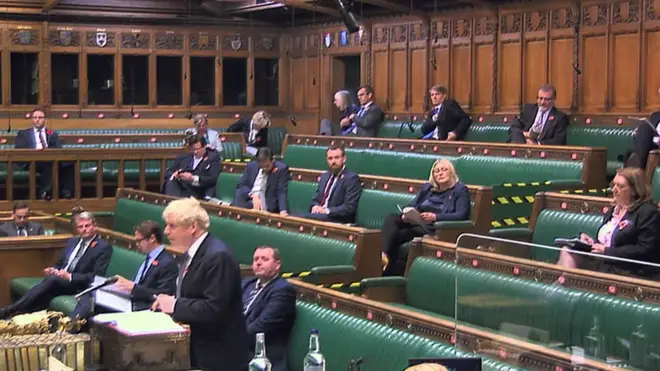
James O'Brien 10am - 1pm
24 March 2021, 10:10

Labour leader Sir Keir Starmer will face off against Boris Johnson later as Prime Minister's Questions takes place.
Both party leaders will be in the Commons chamber for their weekly joust as Labour leader Sir Keir Starmer faces Prime Minister Boris Johnson as the two trade barbs in the Commons chamber.
With the UK passing the milestone of a year since the first coronavirus lockdown MPs are sure to bring up issues related to the vaccine and proposals to extend Covid laws.
Boris Johnson is also sure to face questions and comment from MP's over comments he made before a committee of backbench Tory MPs.
The PM joked that 'capitalism and greed' has made the UK's coronavirus vaccine programme a success.
And as it looks likely a war of words with EU could ramp up over the vaccine politicians are highly likely to ask questions of the PM.
Today's Prime Minister's Questions is likely to last for around half an hour as MPs use the chance to grill the Prime Minister.
Held every Wednesday in the House of Commons Question Time is an opportunity for MPs and Members of the House of Lords to question government ministers about matters for which they are responsible.These questions are asked at the start of business in both chambers and are known as 'oral questions'.
The following MPs are expected to ask Boris Johnson a question:
Stephen Farry (North Down)
Nusrat Ghani (Wealden)
Keir Starmer (Holborn and St Pancras)
Robin Millar (Aberconwy)
Ian Blackford (Ross, Skye and Lochaber)
Miriam Cates (Penistone and Stocksbridge)
Ed Davey (Kingston and Surbiton)
Lucy Allan (Telford)
Allan Dorans (Ayr, Carrick and Cumnock)
John Lamont (Berwickshire, Roxburgh and Selkirk)
Afzal Khan (Manchester, Gorton)
Andrew Jones (Harrogate and Knaresborough)
Ronnie Cowan (Inverclyde)
Derek Thomas (St Ives)
Emma Lewell-Buck (South Shields)
Kelly Tolhurst (Rochester and Strood)
Paul Blomfield (Sheffield Central)
Sir Mike Penning (Hemel Hempstead)
Dawn Butler (Brent Central)
Philip Davies (Shipley)
Dave Doogan (Angus)
Andrew Bridgen (North West Leicestershire)
Chris Elmore (Ogmore)
Question Time takes place for an hour, Monday to Thursday, after preliminary proceedings and private business. Each government department answers questions according to a rota called the Order of Oral Questions.
The questions asked must relate to the responsibilities of the government department concerned.
What are the questions about?
Questions asked must relate to the responsibilities of the government department concerned.
Commons oral questions are tabled by MPs at least three days in advance of the Question Time the relevant government department is due to answer.
The order in which the questions are asked is determined by the ‘shuffle’, carried out randomly by a computer.
Only MPs with questions on the order paper are allowed into the chamber and the Commons Speaker asked that those sitting on the green benches obey social distancing rules.
A number of MPs can ask questions from home, via video link.
On the day the questions are due to be asked they are printed in ‘Business Today’ in the Order Paper.
MPs who are called by the Speaker to ask their question do not read it out, but simply call out its number.
When the government minister has replied, the MP can ask one further question, known as a supplementary.
Other MPs may also be called to ask supplementary questions at the discretion of the Speaker.
The Minister must reply to each in turn. Supplementary questions must be on the same subject as the original question.
The Prime Minister answers questions from MPs in the Commons every sitting Wednesday from 12pm to 12.30pm and you can watch it live on LBC.co.uk and on the Global Player.
The session normally starts with a routine question from an MP about the Prime Minister's engagements. This is known as an 'open question' and means that the MP can then ask a supplementary question on any subject.
Following the answer, the MP then raises a particular issue, often one of current political significance. The Leader of the Opposition then follows up on this or another topic, being permitted to ask a total of six questions. The Leader of the Opposition is the only MP who is allowed to come back with further questions.
Most MPs will table the same question about engagements and if they do, only their names will appear on the question book. After the first engagements question has been asked, any other MPs who have tabled the same question are simply called to ask an untabled, supplementary question.
This means, in theory, that the Prime Minister will not know what questions will be asked of them. However, the Prime Minister will be extensively briefed by government departments in anticipation of likely subjects they could be asked about.